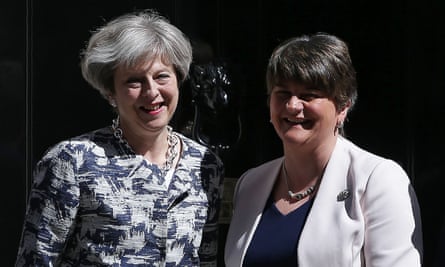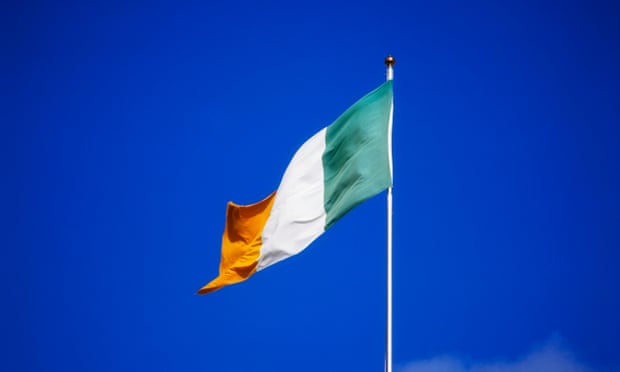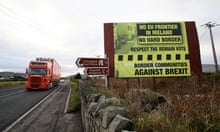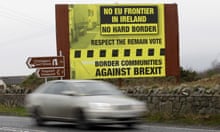In an age of marginal political figures seizing centre stage, it is apt that the most powerful person in Britain this week was not the prime minister but Arlene Foster, a 47-year-old County Fermanagh solicitor and the first woman to lead Ian Paisley’s staunchly loyalist Democratic Unionist party.
Until she torpedoed Theresa May’s initial Brexit deal on Monday, Foster’s most notable contribution to public life had been the spectacular mismanagement of a subsidy scheme for woodchip boilers that led to Northern Irish farmers being paid up to £1m to heat empty barns.
Even close allies thought she should have resigned over the embarrassing “cash for ash” farrago, which looks set to cost taxpayers £1bn. Her refusal brought the entire power-sharing executive tumbling down in January. But then Foster is nothing if not stubborn.
After June’s general election, she and her band of 10 DUP MPs kept the nation waiting while she wrung £1bn out of Theresa May to prop up the Conservatives’ parliamentary minority. Critics were aghast at the power being wielded by such a social conservative who opposes abortion and gay marriage. She is, one critic claimed, “quite out of her depth”. However, allies strongly disagree and, with the assistance of her deputy leader, the veteran negotiator Nigel Dodds MP, she seems to be playing her hand strongly right now.
In the early hours of Friday they extracted a further price from Downing Street in the form of a guarantee Northern Ireland would not be set adrift from the rest of the UK because of difficulties over the Irish border in the first phase of the Brexit agreement. Nigel Farage, another former marginal player, declared himself delighted at her “heroic role” when she pulled the rug from the deal on Monday.
The politics of the border has always been fundamental to Foster. She is the daughter of a farmer and part-time police reservist in the border county of Fermanagh, where during the Troubles the IRA regularly murdered farmers.
“Growing up along the border marks her unionism,” said Tom Elliott, a former Ulster Unionist MP who knew Foster and her farming family. “Those at the edge of the union like Arlene are the ones that value the union more than say those in the east of the province.”
Foster was aged just eight when at 9.30pm one evening her father, John Kelly, went out to close the animals in for the night at their farm.
“I was in the kitchen and my mother was sitting on the edge of the table and she just froze when the gunshots went off,” she later recalled. “I didn’t know what they were until my father came in on all fours crawling, with blood coming from his head.”
Her father had been shot in the head by the IRA but survived. The terrible thing, Foster later said, “was knowing one of his neighbours must have set him up”. The family were moved for their protection to a Belfast council house, where Foster hid under the bed covers at night in fear the terrorists would return.
Foster was born Arlene Isobel Kelly in 1970, just in time for the bloodiest era of the Troubles. Her parents had created a “very simple, happy, rural life” at their farm near Roslea, but in the first two years of her life nearly 500 people were killed in Northern Ireland.
A few years, after the attack on her father, came another near miss. While she was at Enniskillen Collegiate Grammar School for Girls she was almost killed in a bomb attack on a school bus driven by a part-time soldier in the British army’s Ulster Defence Regiment. The girl she was sat next to almost died. It left Foster feeling “very bitter”, she later said.

Foster became the first person in her family to go to university and in her first days of studying law at Queen’s in Belfast she joined the student Ulster Unionists Association. It became a key network from which many of today’s DUP leaders would emerge.
Margaret Thatcher’s signing of the Anglo-Irish agreement in 1985 had “wakened a sense of betrayal” in young unionists, recalled Peter Weir, Northern Ireland’s former education minister who has known Foster since they met as law students in 1989. Unionists feared it was the beginning of the increasing influence of Dublin in the province.
“There was a belief you couldn’t sit back and let events happen,” Weir said. “We were pitched into a position of minority status. If you are in that position and want to win you can’t simply rely on showing up with a block vote. You have to out-organise, out-manoeuvre and out-think your opponent. It was a good training ground.”
In 1995, Foster married William Foster, now a police officer, and worked as a general solicitor in Enniskillen. They had three children, the youngest now 11 and the oldest 18. Foster became increasingly active in the Ulster Unionist party with the so-called “baby barrister” group of Queen’s-educated lawyers, who were opposed to what would become the Good Friday agreement which was being backed by their party leader, David Trimble. Emotive issues such as prisoner release and the winding-up of the RUC were red lines.
Between 1998 and 2004, the group were thorns in Trimble’s side as he sought to reconcile unionism with its historic enemies in the republican movement. Foster ended up defecting to the rival DUP alongside UUP MP Jeffrey Donaldson.
Both Martin McGuinness and Foster served as ministers in the Northern Ireland executive throughout its existence from 2007 to 2017. For the last two years she worked alongside the former IRA commander-turned Sinn Féin politician. She was first minister and he was deputy first minister. It was not always easy. When McGuinness died in March, it took a lot of “soul-searching” for her to attend his funeral. The former IRA commander had delivered an oration at the funeral of Séamus McElwaine, the man suspected of shooting her father.
Foster’s brinkmanship this week can be seen as rooted in the “cut and thrust” and “nasty” brand of northern Irish politics from which she emerged.
“You need to be tough to get through that,” said Weir. “She can be tough with individuals who are against her as we saw this week. She is not someone who is easily cajoled or flattered.”
Her long experience in the detailed negotiations of Ulster politics also imbued in her “an awareness of the significance of language – not just what it says, but what it can lead to”, he said.
So it was never likely she would let pass Downing Street’s ambiguous language on the border question about “regulatory alignment” between the Northern Ireland and the Republic of Ireland.
Quick GuideWhy is the Irish border a stumbling block for Brexit?
Show

Counties and customs
Inside the EU, both Ireland and Northern Ireland are part of the single market and customs union so share the same regulations and standards, allowing a soft or invisible border between the two.
Britain’s exit from the EU – taking Northern Ireland with it – risks a return to a hard or policed border. The only way to avoid this post-Brexit is for regulations on both sides to remain more or less the same in key areas including food, animal welfare, medicines and product safety.
The 'backstop' in Theresa May's Withdrawal Agreement was intended to address this - stating that if no future trade agreement could be reached between the EU and the UK, then rules and regulations would stay as they are. This has been rejected by Brexit supporters as a 'trap' to keep the UK in the EU's customs union, which would prevent the UK striking its own independent trade deals.
There are an estimated 72m road vehicle crossings a year between Northern Ireland and the Republic of Ireland, and about 14% of those crossings are consignments of goods, some of which may cross the border several times before they reach a consumer. Brexit supporters say this can be managed by doing checks on goods away from the border, but critics say it will be difficult to police this without any physical infrastructure like border posts or cameras, which could raise tensions in the divided communities of Ireland.
Interactive: A typical hour in the life of the Irish border
Foster remains a divisive figure. Earlier this year she compared republicans to “crocodiles” and during the general election she was heavily criticised for talking with Jackie McDonald, a leader of the loyalist paramilitary group, the UDA, while canvassing in south Belfast.
Her leadership of the DUP since 2015 has nevertheless cemented its transition into unionism’s big tent. It had emerged in the early 1970s from Paisley’s Christian Free Presbyterian church, which regarded the Pope as the anti-Christ and used its influence on district councils to lock up playgrounds on a Sunday. But Foster came from the mainstream Anglican Church of Ireland tradition and while the DUP has blocked gay marriage in Northern Ireland, the Rev Chris Hudson, who preaches at Belfast’s All Soul’s church, the spiritual home of LGBT Christians, believes “Arlene has many gay friends and is comfortable with the gay community”.
“She is in a party that has blocked gay equality but she is no homophobe,” he said.
Eoghan Harris, a southern Irish political strategist, met Foster this year and found her “humble and funny”.
“Like most cradle Catholics, I have an antenna for a Protestant bigot but I knew straight away that Arlene was no bigot,” he said. “Which is some moral achievement when you think she saw her own father bleeding on their kitchen floor after an IRA murder attempt.
“I told her the Irish language should not frighten unionists given the role played by Presbyterian scholars in keeping written Irish alive,” he said. “She listened carefully and shortly afterwards she visited a Roman Catholic school, spoke some Irish and tried to reach out. She got little thanks for her effort.”
Her performance this week is likely to win her greater applause from her allies.










